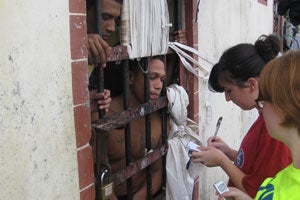The United Nation’s Committee on the Rights of the Child is currently examining Panama’s record on children’s rights with the help of a report coauthored by Harvard Law School’s International Human Rights Clinic.
Produced in collaboration with Panamanian civil society groups, the report documents the serious failure of the juvenile detention system to protect the basic rights of children. It focuses on the now-notorious fire at Panama’s Tocumen juvenile detention center, which started when police threw tear gas bombs that ignited a mattress, and ended with seven boys burning in their cells while guards watched from outside the building.
Five of the boys died.
“Make no mistake about it: the fire at Tocumen was both foreseeable and preventable,” said HLS Visiting Professor James Cavallaro, former executive director of the school’s Human Rights Program. “Unless Panama changes its failed policies, tragedies such as these will continue to occur.”
The 26-page report, titled “Preventable Tragedy in Panama—Unnecessary Deaths and Rights Violations in Juvenile Detention Centers,” is based on visits to four detention centers and interviews there with some 75 children and adolescents; meetings with detention center agents, other officials and stakeholders; and a review of official documents and information from government sources. It includes a legal analysis, which describes Panama’s obligations under the Convention on the Rights of the Child and other international standards, and concludes that Panama has failed to protect the rights of juvenile detainees and has subjected them to cruel, inhuman, and degrading treatment.
According to the report, juveniles throughout the Panamanian juvenile detention system are routinely deprived of basic necessities, like water, fresh air, and light. Prison administrators crowd juveniles into small cells, and allow them only a few hours of schooling or recreation per week. In interviews, juveniles described regular beatings by guards. They also reported being shot with rubber bullets and sprayed with tear gas.
The incident at Tocumen was not the first fire in a detention center, nor was it the last. A day before the U.N. Committee met to review Panama’s record, another fire broke out, this time at the Arco Iris detention center. At least a dozen juveniles suffered burns.
“As a nation rich in resources, Panama can and should do better,” said Virginia Corrigan ’11, a primary author of the report and a member of the IHRC team. “It’s a matter of political will.”
Sara Zampierin ’11 and Maria Luisa Romero ’08 also contributed to the report, which is part of a multi-year project on detention conditions in Panama. See a detailed summary of the IHRC findings and recommendations; download a copy of the report in English and in Spanish.
The U.N. committee began its regular evaluation of Panama in September, and is expected to provide its final conclusions and recommendations during its 58th session in September and October.
